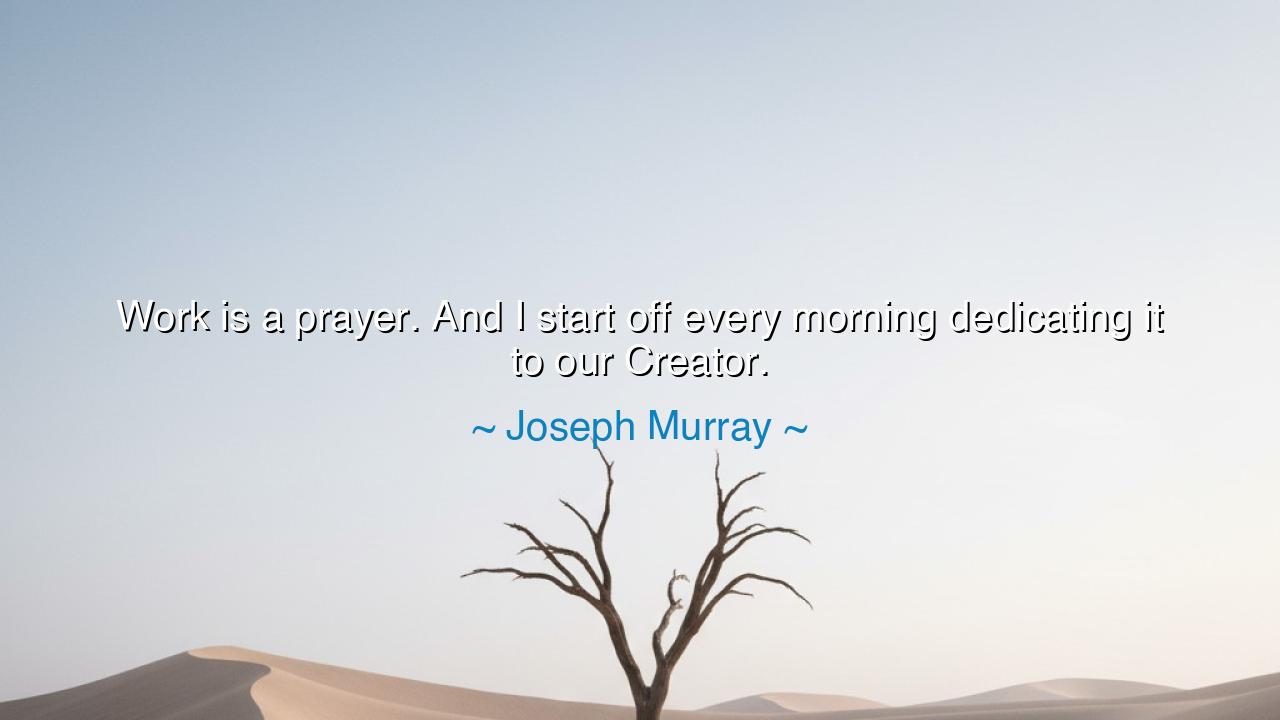
Work is a prayer. And I start off every morning dedicating it to






Joseph Murray, the surgeon and Nobel laureate, once said: “Work is a prayer. And I start off every morning dedicating it to our Creator.” In this simple, radiant confession lies a vision of labor not as drudgery, nor as mere means of survival, but as an offering, a sacred act of devotion. For Murray, the surgeon’s scalpel was not only a tool of science but also an instrument of worship, each incision a hymn, each healing a sacrifice of thanksgiving.
To call work a prayer is to sanctify the everyday. It means that the hours spent in toil are not wasted in the dust of the earth but lifted to the heavens. The monk who copies manuscripts, the farmer who tills the soil, the physician who saves lives—all are priests in their own temples when they work with reverence and intention. Murray reminds us that prayer is not only on bended knee; it is also in the steady hand, the focused mind, and the heart that labors with love.
The ancients, too, knew this truth. In the Hindu tradition, the Bhagavad Gita teaches karma yoga—the path of selfless action—as a way to serve the divine. In medieval Europe, the Benedictine monks declared, Ora et labora, “pray and work,” teaching that both were one and the same. And in ancient Egypt, craftsmen carved temples not only as wages for kings but as offerings to gods, believing their chisels and sweat became a form of worship. Murray stands in this long lineage, his morning dedication echoing the timeless idea that every day begins at the altar of labor.
His own life story gives the words weight. Joseph Murray performed the world’s first successful organ transplant, gifting life where death was certain. To him, such a deed could not be only science—it was participation in creation itself, a reflection of divine craftsmanship. By calling his work a prayer, he acknowledged that he was not the sole architect of healing, but a servant channeling wisdom greater than his own. This humility transformed his skill into sacred service.
There is also warning in his words. If work is not consecrated, if it is done in pride, greed, or neglect, it becomes empty—labor without light. But when one begins the morning by dedicating it to the Creator, the smallest task becomes meaningful, and even the most menial duty shines with dignity. The janitor who cleans with love, the teacher who instructs with care, the parent who provides with patience—all are offering prayers as profound as any uttered in cathedral or temple.
The deeper lesson is that we are not judged solely by the greatness of our deeds but by the spirit in which they are done. A single act of work done in reverence can echo louder in eternity than the grandest triumphs performed in arrogance. Murray’s words call us to align labor with devotion, to see our careers and daily responsibilities as part of a sacred rhythm that unites earth with heaven.
Therefore, remember this teaching: when you rise each morning, do not enter your work as though it were a burden. Enter it as though you stepped into prayer. Dedicate your hands, your mind, your effort to something beyond yourself. Let each task, great or small, be lifted as an offering to the Creator. For in doing so, your life ceases to be divided between the holy and the ordinary, and every moment becomes worship. This is the path Joseph Murray walked, and it is the path open to us all.






AAdministratorAdministrator
Welcome, honored guests. Please leave a comment, we will respond soon